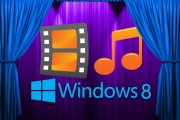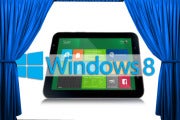The buzz around Windows tablets is at fever pitch now, on the eve of Microsoft’s mystery announcement in Los Angeles on Monday.
 The rumor mill favors some big news regarding Microsoft’s Windows 8 tablets, but the Los Angeles location would seem to indicate that Microsoft may have an entertainment angle in play, as well, perhaps a content store that will challenge Apple’s iTunes, Google’s Play, and Amazon’s services on its Kindle Fire Android tablet.
The rumor mill favors some big news regarding Microsoft’s Windows 8 tablets, but the Los Angeles location would seem to indicate that Microsoft may have an entertainment angle in play, as well, perhaps a content store that will challenge Apple’s iTunes, Google’s Play, and Amazon’s services on its Kindle Fire Android tablet.Several analysts theorized that, as an entertainment capital, L.A. could offer the backdrop for media content on any new tablet, including games, movies, or more.
Rob Enderle, an analyst at Enderle Group told our sister publication Computerworld that Monday's announcement could be an Xbox-like tablet subsidized with games that users would buy. "Xbox does do announcements in L.A., and they did just announce Xbox SmartGlass at the E3," Enderle said.
Or, he added, the news could be merely a speculative product "designed to get the industry excited" with a focus on the tablet as a content-consumption device. "Content is where I think Microsoft is focused."
Another possibility: That Microsoft may be getting into the hardware business itself, manufacturing its own tablet.
Whichever path Microsoft announces Monday, one thing is for certain. Windows 8 tablets are coming, and they’re coming soon. The question is, what will they bring to the party that other comers haven’t? And will these tablets be able to mount a credible challenge to Apple’s iPad, or the mounds of Android 4.0 tablets?
Here are five things that Microsoft and Windows 8 tablets need to have to make an impact.
Easy Content Acquisition
 Apple and Amazon have excelled in making it dead simple for consumers to shop for their music, videos, and TV shows. Apple makes downloading content for local use as easy as it gets via iTunes, while Amazon makes it easy to download and stream from its cloud services (the Kindle Fire’s limited local storage makes it less viable to store your media locally).
Apple and Amazon have excelled in making it dead simple for consumers to shop for their music, videos, and TV shows. Apple makes downloading content for local use as easy as it gets via iTunes, while Amazon makes it easy to download and stream from its cloud services (the Kindle Fire’s limited local storage makes it less viable to store your media locally).Google’s Play store lets you shop for music, but it remains a bit awkward. And movies are still merely rentals, not buy-to-own. No TV shows in sight.
Microsoft tablets have a huge opportunity to take a lead here, if the company can master the shopping experience and cover its bases across music, movies, and television.
Competitive Pricing
 Even though we’ve heard the first tablets announced in early June at Computex, we haven’t seen anything firm about pricing. Microsoft tablets will need to come in at a price that’s, at the least, competitive with its Apple and Android competition. And ideally, at a price that undercuts the competition--just enough so that consumers take notice, and are enticed to consider something new.
Even though we’ve heard the first tablets announced in early June at Computex, we haven’t seen anything firm about pricing. Microsoft tablets will need to come in at a price that’s, at the least, competitive with its Apple and Android competition. And ideally, at a price that undercuts the competition--just enough so that consumers take notice, and are enticed to consider something new.Hitting this kind of pricing may be difficult, however, if reports that Microsoft’s charging manufacturers around $80 to $90 for the OEM version of Windows RT prove true. (Windows RT is the version of Windows 8 that’s designed for use on system-on-chip ARM processor-based tablets. These tablets are the ones that will most directly compete with Apple’s iPad and the variety of Android tablets.)
Better-Than-The-Rest Specs
 Microsoft tablets will be, arguably, more than just fashionably late to the tablet party. As such, tablet makers need to eschew last year’s specs, and go straight to something that will get shoppers’ attention. And like it or not, specs do get attention.
Microsoft tablets will be, arguably, more than just fashionably late to the tablet party. As such, tablet makers need to eschew last year’s specs, and go straight to something that will get shoppers’ attention. And like it or not, specs do get attention.[Related: A Microsoft Tablet--What Will it Look Like?]
Things like a minimum of 32GB of built-in storage, and a high pixel-density display (at minimum, a resolution of 1920 pixels by 1200 pixels, which is less than iPad’s 2048-pixel-by-1536-pixel resolution but superior to the existing baseline resolution of 1200 pixels by 800 pixels on a 10.1-inch display) feel de riguer.
And upping memory wouldn’t be a bad move, either; current tablets are locked at 1GB of memory, but 2GB could go a long way to smoothing the playback experience while using the tablet for other tasks, too.




